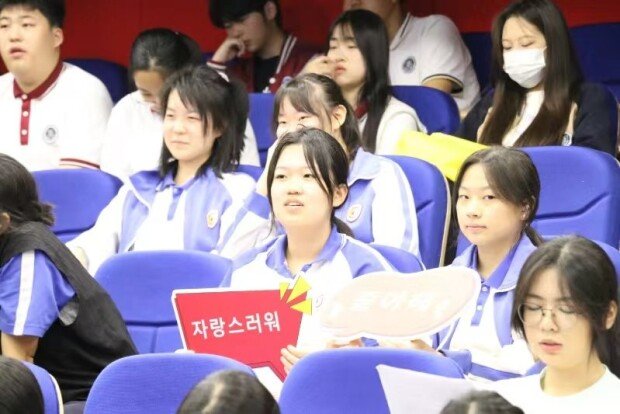School girls fascinated by Korean language
School girls fascinated by Korean language
Posted September. 07, 2024 07:18,
Updated September. 07, 2024 07:18

"Sipping coffee while looking at the Han River is the best."
"Everything feels romantic when you go to Myeong-dong (referred to as 'Ming'-dong in Chinese Pinyin)."
These are the words of Chinese students who participated in the "2024 Korean Speech Contest" held at the Korean Cultural Center in Beijing, China, on Wednesday. Although they struggled with the "ㄹ" sound, which doesn't exist in Chinese, and some expressions were not entirely accurate, all 18 participants completed their three-minute presentations. This was the first time the Korean Embassy in China hosted a Korean speech contest.
The participants' biggest interest was in K-pop. Zhang Shuyu (17) from Beijing No. 11 School, who won first place in the competition, said she learned Korean by singing BTS songs. Another participant shared, "I became interested in Korean after seeing K-pop posters in my older sister’s room when I was younger. The freedom it represented was captivating, so different from my homework-filled life."
"I loved the sense of relaxation I felt by the Han River during my trip to Seoul," some students remarked. "I can't forget the Namsan pork cutlet and Myeong-dong kimbap."
Currently, the Korean Embassy in China supports Korean language classes in nine schools throughout the Beijing area. As a result, around 2,000 students, including those in after-school programs, are learning Korean as a second foreign language. Starting this year, the embassy plans to hold the "Korean Speech Contest" annually to encourage students and actively work on discovering more schools willing to adopt Korean language courses.
Ko Hyeon-seok, the principal of the Beijing Korean International School and one of the judges for the event, expressed his hopes by saying, "Chinese students who learn Korean language and culture in their childhood will become the seeds that strengthen relations between the two countries in 10 years." Despite the ongoing effects of the "Korean Wave Ban" (限韩令) and the intense pressure of university entrance exams similar to that in Korea, he praised the participants' remarkable passion for learning Korean.
Chul-Jung Kim tnf@donga.com
Headline News
- Joint investigation headquarters asks Yoon to appear at the investigation office
- KDIC colonel: Cable ties and hoods to control NEC staff were prepared
- Results of real estate development diverged by accessibility to Gangnam
- New budget proposal reflecting Trump’s demand rejected
- Son Heung-min scores winning corner kick







